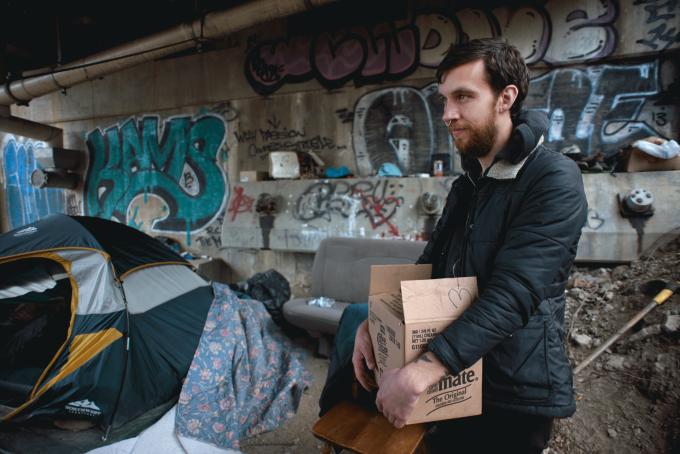Graduate Psychology Students Listen to Pittsburgh's Homeless

The Point
Spring 2016
For students enrolled in Point Park University's clinical-community psychology program, the opportunity to partner with Pittsburgh Mercy's Operation Safety Net meant taking classroom lessons literally to the streets - something Operation Safety Net has done for nearly 25 years.
"I've lived in Pittsburgh my entire life, but after being a part of this project, the city has opened up to me in completely new ways. Words like 'home', 'bridge', 'streets', and 'cold', will never be the same for me again," said Calla Kainaroi.
Kainaroi, along with fellow students Jeremy Northup and Alexandria Bright - all pursuing an M.A. degree in clinical-community psychology - are visiting and speaking with men and women living on the streets of Pittsburgh as part of a practicum in advocate ethnography.
Partners with Operation Safety Net
The idea for partnering with Operation Safety Net began when Robert G. McInerney, Ph.D., associate professor of psychology, met Operation Safety Net founder and medical director James S. Withers, M.D., at a campus lecture several years ago. Operation Safety Net, which is part of Pittsburgh Mercy and Trinity Health, serving in the tradition of the Sisters of Mercy, was founded by Withers who began providing medical care to Pittsburgh's unsheltered homeless population in 1992.
"Jim expressed the need for a better understanding of the people he helps, beyond the important medical and social service interventions he and his staff provide. I explained that this is exactly what our students are being trained to do in the clinical community psychology program and as ethnographers," said McInerney.
An advocate ethnographer works within a particular community and participates by observing the rituals, practices and functions that take place. Ethnography is an integral part of the clinical community psychology program because it focuses on promoting mental health and well-being as well as social and cultural influences for personal well-being.
A Sensitive, Gradual Process
The process of information gathering, especially interviews with men and women experiencing homelessness, is sensitive and gradual. Students need to build a level of trust during the interview process so that the data they collect is an accurate reflection of an individual's story, experiences and challenges. Even though the interview process is gradual, there is a research protocol that has been established in which students ask a series of 8-10 open-ended questions in a semi-structured interview process. The interviews are audio recorded, transcribed and reviewed by McInerney.
"As an ethnographer you aren't viewing what is going on behind a glass wall, you're up close and involved," said Alexandria Bright. "I'm able to be curious and ask questions while taking note of what I am thinking and feeling and all of that is part of the data we collect. There aren't many avenues in mainstream science where your opinions and experiences matter or are encouraged at all," said Bright.
For Operation Safety Net, the partnership with Point Park is an opportunity to go beyond the critical medical and social services help Withers and his team provide to people experiencing homelessness. "This initiative will allow us an additional powerful tool to understand the complex issues of those we serve," said Withers. "Although we respond to the immediate needs of those on the streets, some of the deeper aspects of their experience can sometimes be missed in the process. We care about the whole person, so this partnership will hopefully provide us with insights that will guide us in serving them better."
Efforts to Enhance Well-being
An important overall goal of the Operation Safety Net partnership, and of Point Park's clinical-community psychology program, is to enable students to enhance the well-being of individuals, groups and communities through research, community assistance and clinical practices.
McInerney hopes that the Operation Safety Net and Point Park partnership extends for many years. Not only will students benefit from the unique experience, but also their research may provide "consciousness raising for our city with regard to the experience of homelessness and may also contribute to better serving a community facing many complex challenges," said McInerney.
Text by Barbara Vilanova
Photo by Martha Rial
The Point is a magazine for alumni and friends of Point Park University.

